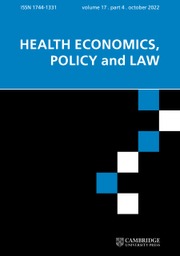Article contents
Exorcising the positivist ghost in the priority-setting machine: NICE and the demise of the ‘social value judgement’
Published online by Cambridge University Press: 11 February 2021
Abstract
The National Institute for Health and Care Excellence (NICE), the UK's primary health care priority-setting body, has traditionally described its decisions as being informed by ‘social value judgements’ about how resources should be allocated across society. This paper traces the intellectual history of this term and suggests that, in NICE's adoption of the idea of the ‘social value judgement’, we are hearing the echoes of welfare economics at a particular stage of its development, when logical positivism provided the basis for thinking about public policy choice. As such, it is argued that the term offers an overly simplistic conceptualisation of NICE's normative approach and contributes to a situation in which NICE finds itself without the necessary language fully and accurately to articulate its basis for decision-making. It is suggested that the notion of practical public reasoning, based on reflection about coherent principles of action, might provide a better characterisation of the enterprise in which NICE is, or hopes to be, engaged.
Keywords
- Type
- Perspective
- Information
- Copyright
- Copyright © The Author(s), 2021. Published by Cambridge University Press
References
- 3
- Cited by



